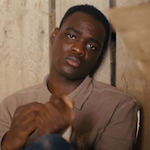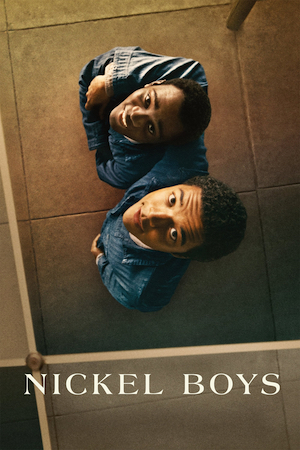 NICKEL BOYS is one of the underdog Best Picture nominees, one of the indies that doesn’t get that much discussion outside of film critic circles, definitely not seen as a frontrunner, but happy to be nominated. I was planning to see it anyway based on the effusive praise I’d seen, but the nomination gave me an extra push to see it on the big screen, so that’s a nice thing about the Oscars.
NICKEL BOYS is one of the underdog Best Picture nominees, one of the indies that doesn’t get that much discussion outside of film critic circles, definitely not seen as a frontrunner, but happy to be nominated. I was planning to see it anyway based on the effusive praise I’d seen, but the nomination gave me an extra push to see it on the big screen, so that’s a nice thing about the Oscars.
I was also able to see it pretty much blind. I did see a trailer before another movie a few days earlier, but that actually didn’t make it very clear what it was about. It did make me wonder if it was going to be told in first person perspective, which does turn out to be the case. Most of the time the camera represents what the main character Elwood Curtis is seeing. So, you know, it’s kind of like the classy version of HARDCORE HENRY or the MANIAC remake. There’s also a section where the camera follows behind the character’s head, like a video game (or IN A VIOLENT NATURE). Director of photography Jomo Fray (ALL DIRT ROADS TASTE OF SALT) shoots it both cleverly and beautifully. It’s kind of the same category as I’M STILL HERE: some beauty and nostalgia in a story about resilience in the face of horrible atrocities. But leaning heavier on the latter this time, and using the former to make it all the more eerie what we know is going on here.
Elwood (Ethan Cole Sharp) is a promising young Black man in Tallahassee in the early ’60s. It’s an extremely racist time and place but he’s a smart kid and has a really outstanding teacher (Jimmie Fails, THE LAST BLACK MAN IN SAN FRANCISCO) who encourages him and helps him get into a free program at an HBCU. But while hitchhiking to get there he gets picked up by a guy driving a stolen car, they get pulled over and the next thing you know he’s convicted as an accomplice and sent to a reform school called Nickel Academy.
 I know it’s supposed to be illegal now to acknowledge shameful parts of American history, but here’s another one. Think of those psychos who run camps for troubled youths, make big speeches as if they’re inspiring them and then torment and terrorize them, sometimes to death. Now add in that the instructors are white and all the students are Black alleged criminals during the horrible Jim Crow era (the first one). This reminded me of RHYMES FOR YOUNG GHOULS (2013), Jeff Barnaby’s movie about residential schools, a similar type of institution intended to brainwash the culture out of indigenous kids in Canada and the U.S. NICKEL BOYS is based on a fictional (and Pulitzer Prize winning) novel by Colson Whitehead, but that was based on a real school that operated for 111 years, where unmarked graves were later found. When we see archival photos of the school in the movie, those are the real school. It’s like the movie is haunted.
I know it’s supposed to be illegal now to acknowledge shameful parts of American history, but here’s another one. Think of those psychos who run camps for troubled youths, make big speeches as if they’re inspiring them and then torment and terrorize them, sometimes to death. Now add in that the instructors are white and all the students are Black alleged criminals during the horrible Jim Crow era (the first one). This reminded me of RHYMES FOR YOUNG GHOULS (2013), Jeff Barnaby’s movie about residential schools, a similar type of institution intended to brainwash the culture out of indigenous kids in Canada and the U.S. NICKEL BOYS is based on a fictional (and Pulitzer Prize winning) novel by Colson Whitehead, but that was based on a real school that operated for 111 years, where unmarked graves were later found. When we see archival photos of the school in the movie, those are the real school. It’s like the movie is haunted.
Elwood (played by Ethan Herisse [When They See Us] when he gets older) becomes good friends with Turner (Brandon Wilson, THE WAY BACK), who’s more about keeping your head down and avoiding making yourself a target, while Elwood talks about civil rights and Dr. King and trying to get justice. Back at home his sweet grandma (Aunjanue Ellis-Taylor, THE RESIDENT) is talking to a white lawyer who claims he has a strong case to get him out. Good luck with that. One sign of how fucked the situation is is when she comes to the school and isn’t allowed to see her grandson. They say he’s sick. She does randomly meet Turner, and gets him to give her a hug. A sweet moment of vulnerability and maternal love that ends up being important.
The head of the school is Spencer, played by Hamish Linklater (BATTLESHIP), an actor I only know as the monstrous preacher in Mike Flanagan’s Midnight Mass, so as soon as I saw him I figured we were in for a grueling ordeal. In addition to various abuses of the student, he is mired in corruption, for example arranging an interracial boxing match, betting on it, and trying to rig it. (The match itself is considered acceptable, though.)
Elwood and Turner also start getting sent out with school employee Harper (Fred Hechinger, THELMA) to do various tasks off campus. They’re clearly being exploited as prison labor, but in some ways it’s nicer than being in the school, so Turner is very concerned when Elwood starts talking about using all of his documentation of the jobs they’ve been sent on to expose Spencer. Turner has given up on being able to change things, and doesn’t want to risk making it even worse.
It’s a moving story, but it’s the way the movie tells it that’s most interesting. I was skeptical about the first person gimmick at first, but it’s a thrill when Elwood first meets Turner in the cafeteria and then the scene replays with us looking at Elwood. Oh shit, that’s what he looks like? So now we have this added element of trading between two perspectives. Then there’s a big leap to an older Elwood (Daveed Diggs, BLINDSPOTTING) in the 2010s or so, free and owning his own moving business, but remembering the bad old days after he reads online about graves being found on the Nickel campus. It creates great tension by letting us get comfortable about one character’s fate while dreading other now-confirmed outcomes, and it plays with our assumptions and missing context. For me the highlight of the movie is when older Elwood runs into another Nickel survivor (Craig Tate, KING RICHARD) and has a long, uncomfortable conversation that starts with the camaraderie of a shared experience, but goes into trauma, survivor’s guilt, and unbearable tension about Elwood’s life turning out better, and implications about how he might’ve gotten out of there. It’s one of those tour de force scenes you see sometimes, and the whole thing’s just watching from behind Elwood’s head when he’s sitting at a bar.
The director is RaMell Ross (HALE COUNTY THIS MORNING, THIS EVENING), who adapted the book with co-writer Joslyn Barnes. He makes many unusual stylistic choices, like inserting photo montages for historical context, then making us stare at some very digitized photos before revealing that they’re on a computer monitor and this is our gateway into the 2010s flash forward. He also uses Mulatu Astatke’s “Tezeta” in a musical montage that includes horrific discoveries – I love that song, I even had it on my wedding playlist, so that kinda messed me up. But it’s perfect.
I think the first person approach works, but I did come out wondering why Ross chose to do it that way. It may help with a complicated narrative trick I won’t get into, but I don’t think it was really needed for that. One thing that really works about it for me is the way we join young Elwood in staring at the sky or a bug or a wall or something. It reminded me of THE TREE OF LIFE in the way the camera angles create a sort of sense memory of what it felt like to be a kid, and that in turn brings up emotions I had locked away somewhere.
I read in The Hollywood Reporter that Ross used to be a photographer (as well as school teacher), and was thinking of a different idea of a first person movie before he read the book. So maybe that was his starting place. He says that this way the little visual details “are way more poignant, because whether or not you think the POV is working, you still know you’re in point of view, so you’re forced to consider that angle as your own angle because you’re the character.” Yeah, okay, I buy it. I’m glad I saw NICKEL BOYS.


























February 19th, 2025 at 9:49 pm
Thank you for this excellent review. I haven’t seen “I’m Not Here”, but to me this was by far the most accomplished and stylistically-interesting movies nominated for Best Picture by far. In fact, I was surprised it was in the Best Picture listing but ignored in a lot of the crucial technical categories, when I would have expected it would be the other way around.
There are so many fragments of this that will stick with me. It’s interesting that the main story gets a little pulpy, but the style of the film is still a Dusan Makajevev-style pop collage at times.
Surprised that you didn’t remember Hamish Linklater from a lot of stuff. He’s pretty good and believable here, but really, one of my least-favorite character actors in the business. I feel like there’s something very affected and inarticulate about him, he seems like a wisp of a guy in a lot of roles. There was a lot of up-talk in his earlier performances — a lot of that has gone away, enough for him to voice Batman in that Amazon show! But in that case, I think he’s just doing a lousy Conroy imitation, not his own spin.
I saw this alone in the theater on a Saturday night, which was immensely depressing. It’s amazing that the studio got this eccentric film Oscar attention, but seemingly couldn’t get a single person into the theater to see it. It’s really like nothing I’ve ever seen, I wish they told more people how distinct and original it was, instead of the whole abstract-imagery-with-hyperbolic-critic-quotes ads. If this is playing near you, guys, don’t wait for it to stream.